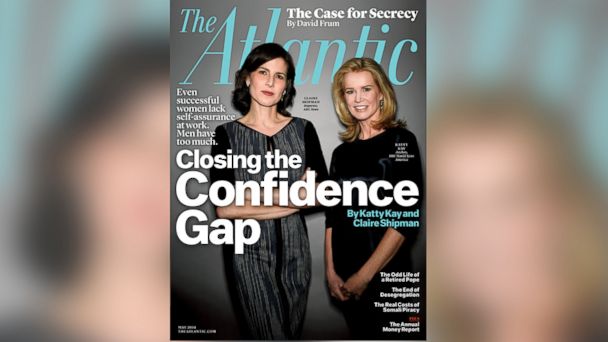5 Common Confidence Mistakes Women Make, and the Confidence Quiz
ABC News' Claire Shipman reports:
We all know those familiar, frustrating feelings. We're afraid to speak up at a meeting because we aren't sure what we have to say is perfect. And then a few minutes later, a male colleague says exactly what we had in mind.
Perhaps we've contemplated taking a larger step - a run for local office or a change of career - but we opt for caution over risk. For most women, such feelings are so commonplace we've discount them. But, in truth, they represent a profound confidence gap between men and women, especially in the workplace.
My co-author on " The Confidence Code," Katty Kay, and I have come to believe that gap is in large measure why we have failed to reach the highest levels in the workplace.

The Atlantic
Think about the damaging consequences of these common habits.
Scroll down to take the Confidence Quiz and See 5 Common Confidence Mistakes Women Make
- Women won't seek promotions unless they feel they have close to 100 percent of the qualifications, while men will go for it if they think they have 60 percent. Hewlett-Packard and others have done these studies, and quickly grasped what this meant in terms of women's getting ahead.
- Numerous studies have been done in which men and women are given the same test, usually a math or science test, and are then asked how they believe they have performed. The women always predict they've performed much worse than they have. The men tend to think they've done better. Indeed, the scores are almost identical. Imagine what that self-criticism does to women on a day-to-day basis.
- One Princeton research team decided to study just how much less women speak than men do, when they are in the minority. In some cases, researchers found, up to 75 percent less.
That nugget really caught my attention. For years I'd had an inkling that I wasn't talking as much as the men on political programs I was on. I was constantly aware of trying to stick to the question, and not take too much time. Although I wasn't aware of it at the time, it was quite classic "good girl" behavior.
In writing "The Confidence Code," I did a quick comparison of my appearances on "This Week." My self-editing got me 30 percent less talk time on average than the men. There's nothing terrible about that, of course, but it was sobering to have a number put on my hesitation.
In the course of our research project, we dug into the origins of the confidence gap. Our book looks at genetic influences, brain architecture and function and the impact of society. All play a role. But we also discovered that part of our confidence is volitional: it's something we can control. We can increase our confidence level at any age.
For more information on genetic testing, visit here.
Five Common Confidence Mistakes Women Make:
- We think too much. Women are much more likely than men to ruminate. Excessive examination actually inhibits confidence because it can keep women from taking action. Consider this: You're debating whether to recommend a course of action at work. It's a tough call, and you dig in to examining both sides in-depth. But your examination takes so long, that you start to lose your ability to make a decision. Frozen, you decide not to weigh in at all.
- We believe failure is a failure. Failing is actually cool now. Fail fast is a hot tech buzz phrase. In today's business climate, failing means you've been willing to try, to get in the game. And it means you've learned.
- We carry criticism around with us far too long. We have to learn to toughen our hides, as Hillary Clinton said last week. Imagining that the rest of the world, or your boss, or whomever, is still focused on that thing involving you is not only a waste of time, but a confidence killer.
- We never leave our comfort zones. Confidence comes from risk-taking, but we are too determined to be perfect.
- We don't speak up, and too often, we use upspeak. It's a habit we know you'll recognize, raising the tone of your voice at the end of a sentence in a way that suggests a question rather than a declaration. Try these: "I think we should go with the on-line marketing strategy." "I think we should go with the online marketing strategy?" One professor told us he thinks women use upspeak in an effort to seek approval. Lose the questioning tone, and boost your confidence.